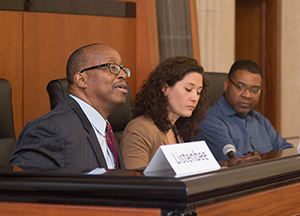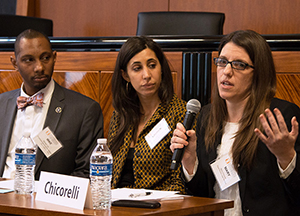A daylong CLE at the Kline Institute of Trial Advocacy on Feb. 9 explored the barriers to justice faced by women, immigrants and a large percentage of criminal defendants.
“Liberty and Justice: Moving from Some to All” was sponsored by the Philadelphia Bar Association and organized by law students from the Kline School of Law, Penn Law School, Temple Beasley School of Law, Villanova Widger School of Law, Rutgers-Camden and Widener’s Delaware Law School.
A panel featuring Judge Jane Roth of the U.S. Court of Appeals for the Third Circuit, Penn Law Lecturer Nilam Sanghvi and Temple Professor Colleen Shanahan focused on the challenges that women face, from workplace harassment to whistleblowing.
2L Cassie Grainge moderated a panel with Temple Professor Nina Spizer and attorneys Golnaz Fakhimi of the ACLU of Pennsylvania and Rebecca Hufstader of Nationalities Services Center that explored the challenges that immigrants and their advocates face in a legal system that puts anyone who is not a U.S. citizen at risk of deportation.
The program featured a keynote by Philadelphia District Attorney Larry Krasner, who said his 2017 election reflects a nationwide “wave” of concerns about the criminal justice that swept reform-minded district attorneys into office in Chicago, San Francisco, Brooklyn, Oakland and Corpus Christi.
In Philadelphia, Krasner said, past district attorneys treated the office as a launchpad for higher office, trading on “the politics of fear” to justify the use of tax dollars to build prisons.
Pennsylvania has become the state with the highest incarceration rate in the U.S., Krasner said, while Philadelphia has the highest incarceration rate of the nation’s 10 largest cities.
Reforms have brought positive results in places like Chicago, where the DA trimmed the prison population by issuing summonses in smaller retail theft cases, and in Oakland, where a restorative justice program for juveniles is credited with improving outcomes for victims as well as offenders, Krasner said.
“These are interesting times. There are important and positive developments,” Krasner said, crediting young attorneys and voters who have learned about mass incarceration in their classes.
 A panel including former U.S. Department of Justice administrator and Stoneleigh Foundation Visiting Fellow at Drexel Robert Listenbee, attorney Katrina Young of the Defender Association of Philadelphia and Youth Sentencing & Reentry Project reentry coordinator John Pace tallied the ways that traumatic conditions in the community give rise to encounters with the criminal justice system and the need for advocates to assess these factors on their clients’ behalf.
A panel including former U.S. Department of Justice administrator and Stoneleigh Foundation Visiting Fellow at Drexel Robert Listenbee, attorney Katrina Young of the Defender Association of Philadelphia and Youth Sentencing & Reentry Project reentry coordinator John Pace tallied the ways that traumatic conditions in the community give rise to encounters with the criminal justice system and the need for advocates to assess these factors on their clients’ behalf.
Penn Law Professor David Rudovsky and Villanova Professor Teressa Ravenell joined attorney S. Lee Merritt in discussing strategies for employing civil rights litigation and Section 1983 to fight for their clients’ constitutional rights.
Attorneys Mary Chicorelli of Equal Access Legal Services and Lauren Fine of the Youth Sentencing & Reentry Project joined Interim Director of Legislative Affairs for the Philadelphia District Attorney Mike Lee to provide tips on launching a public interest legal practice from scratch.
 Lee, an ’09 alumnus who co-founded Philadelphia Lawyers for Social Equity, said the lack of legal services for people of color prompted him to create an organization focused on clients’ needs.
Lee, an ’09 alumnus who co-founded Philadelphia Lawyers for Social Equity, said the lack of legal services for people of color prompted him to create an organization focused on clients’ needs.
With the goal of exiting his clients’ lives as quickly as possible, Lee established PLSE’s Criminal Records Expungement Project, which has cleared inaccurate and out-of-date criminal records for thousands of Philadelphians, opening opportunities for them in employment, housing and education.